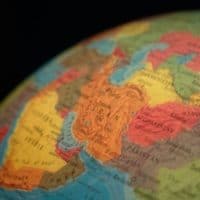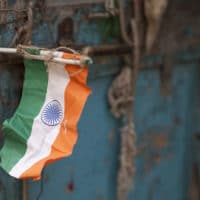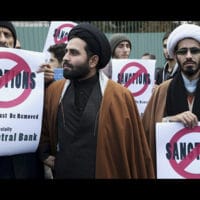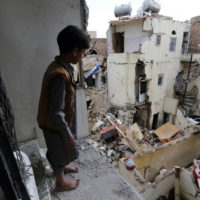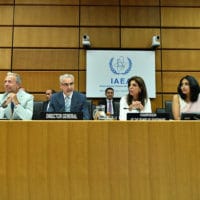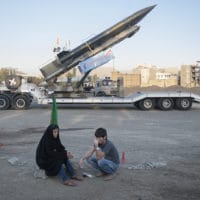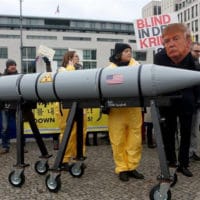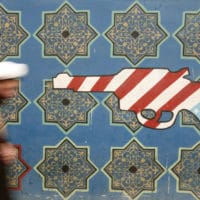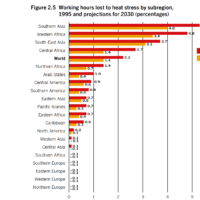-
Not an inch: Indian students stand against the far-right
With her head bandaged and her arm in a sling, university student Aishe Ghosh went before the cameras to say that the students of the university she attends in New Delhi would move “not an inch back.”
-
The current U.S. approach to nuclear weapons can only lead to armageddon—arms control provides the only path to peace
The decade ends with two major threats to humanity: global warming leading to a climate catastrophe and the threat of a nuclear war extinguishing our civilization.
-
Is this the end of U.S. interference in West Asia?
Iran’s Foreign Minister Javad Zarif reacted strongly to U.S. Secretary of State Mike Pompeo’s suggestion that Iraqis were “dancing in the street” to celebrate the assassination. On Twitter, Zarif posted pictures of the funeral procession for Soleimani and wrote, “End of U.S. malign presence in West Asia has begun.”
-
India’s Government is going to war against its own people
On December 13, the United Nations high commissioner for human rights released a powerful statement that criticized India’s new citizenship law. This “fundamentally discriminatory” Citizenship (Amendment) Act of 2019 would expedite citizenship for persecuted religious minorities from India’s neighboring countries. But in the list of those minorities, it names only Hindus, Sikhs, Buddhists, Jains, Parsis, and Christians.
-
How to commit war crimes—and get away with it
U.S. President Donald Trump sacked his Navy secretary on Twitter because he did not follow Trump’s advice and retain Navy Special Warfare Operator Edward Gallagher, despite Gallagher being accused of stabbing to death a wounded fighter, of murdering a schoolgirl and an elderly man, and then of obstructing justice.
-
How U.S. sanctions on Iran are killing innocent people
It is a measure of the fortitude of Iran that—despite these unilateral U.S. sanctions—it has been able to maintain production of medical equipment and drugs. Nonetheless, the Human Rights Watch report should be seen as an alarm.
-
The political tide sweeping South America won’t accept predatory capitalism
The slogan is pithy—Neoliberalismo nunca más (Neoliberalism Never Again). It was chanted in the streets of Santiago, Chile; it was drawn on the walls in Buenos Aires, Argentina; and in a more sober register, it is mentioned in a seminar in Mexico City, Mexico.
-
The IMF convenes in Washington, deaf to the suffering it causes across the planet
No one within the IMF meeting will raise the question of democracy, both in terms of the IMF’s own functioning and in terms of the IMF’s relationship with sovereign countries around the world.
-
Why Argentina’s elites are waging war against Milagro Sala
The leader of the Tupac Amaru Neighborhood Association is a symbol of the fight against the old order.
-
How can Sweden be a peace broker for the war in Yemen if it’s also selling the arms that make it possible?
Sweden might have some credibility if it banned weapons sales to Saudi Arabia and the UAE. It is not enough to be moved by the tragedy in Yemen. Action is necessary.
-
Why the world is watching the fate of an Iranian tanker in the Mediterranean
The British, it is clear, seized the Iranian tanker at the urging of the United States. There was no previous British warning that it might enter in such a muscular way into the U.S. attempt to suffocate Iran.
-
Imagining a free Palestine should be commonplace—that’s why I wrote the novel ‘Siegebreakers’
The siege of Gaza is crushing the people who live under it, and it is crushing all of our imaginations.
-
Why Kashmir is suddenly a potential global point of conflict
Before India’s Home Minister Amit Shah introduced the Jammu and Kashmir Reorganization Bill in the Indian Parliament, his government sent tens of thousands of Indian troops into Kashmir. There is no official number, but it is often said that there are nearly 600,000 Indian troops in the state. That a population of 12 million people needs this kind of armed action suggests that they are an occupied people.
-
Trump’s ‘diplomacy’ in Iran is a cynical farce
The problem for any negotiations is that the U.S. position is untenable. The U.S. wants to prevent Iran from exercising its right under the Nuclear Non-Proliferation Treaty (1968) to enrich uranium even to low levels. It is this impossible position by Washington that will prevent diplomacy.
-
Iran simply won’t let itself be hemmed in by the U.S. and UK
The United States is leading a process to create a naval force that would patrol the Strait of Hormuz. The U.S. has said it will send “command and control” ships to coordinate the escort naval vessels from different countries. But there are cracks in the coalition.
-
The U.S.-Iran standoff can only end when the U.S. accepts Iran’s right to have a nuclear energy program
The U.S. objection to Iran is not based on international law, but merely based on its political objectives. This is clearly illustrated by open U.S. support for nuclear energy and nuclear weapon development in India; and nuclear weapon stockpiling in Israel, which the U.S. has always fully backed.
-
The UK’s dubious role in the new tanker war with Iran
There are signs of a new tanker war in the Persian Gulf, with Britain joining a coalition that wants a war with Iran.
-
Trump murdered the Iran Deal—and Europe isn’t too happy about it
During the July 14, 2019 meeting between France, Germany, and the UK to discuss their response to the U.S. withdrawal from the Iran Nuclear Deal, President Hassan Rouhani remarked that Iran is “always ready for negotiation.” Iran, he said, urges the U.S. to “abandon bullying.”
-
Why Trump caved to China and Huawei
Everything about the trade war between the United States and China is bewildering. Truces would come out of nowhere but then they would be set aside by U.S. President Donald Trump in a stream of tweets at odd hours. Regardless, Huawei and China are unlikely to blink. They have the upper hand.
-
Burnt workers are the newest wave of climate casualty
The International Labor Organization (ILO) has just released a brief—but very important—report on the impact of heat stress on workers. What the ILO finds is that the areas of the world most threatened by heat deaths of workers are Southern Asia and Western Africa.



